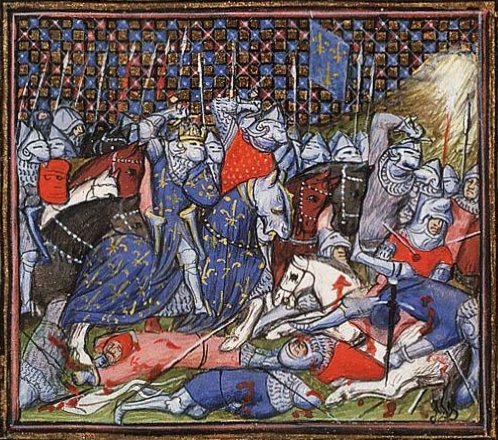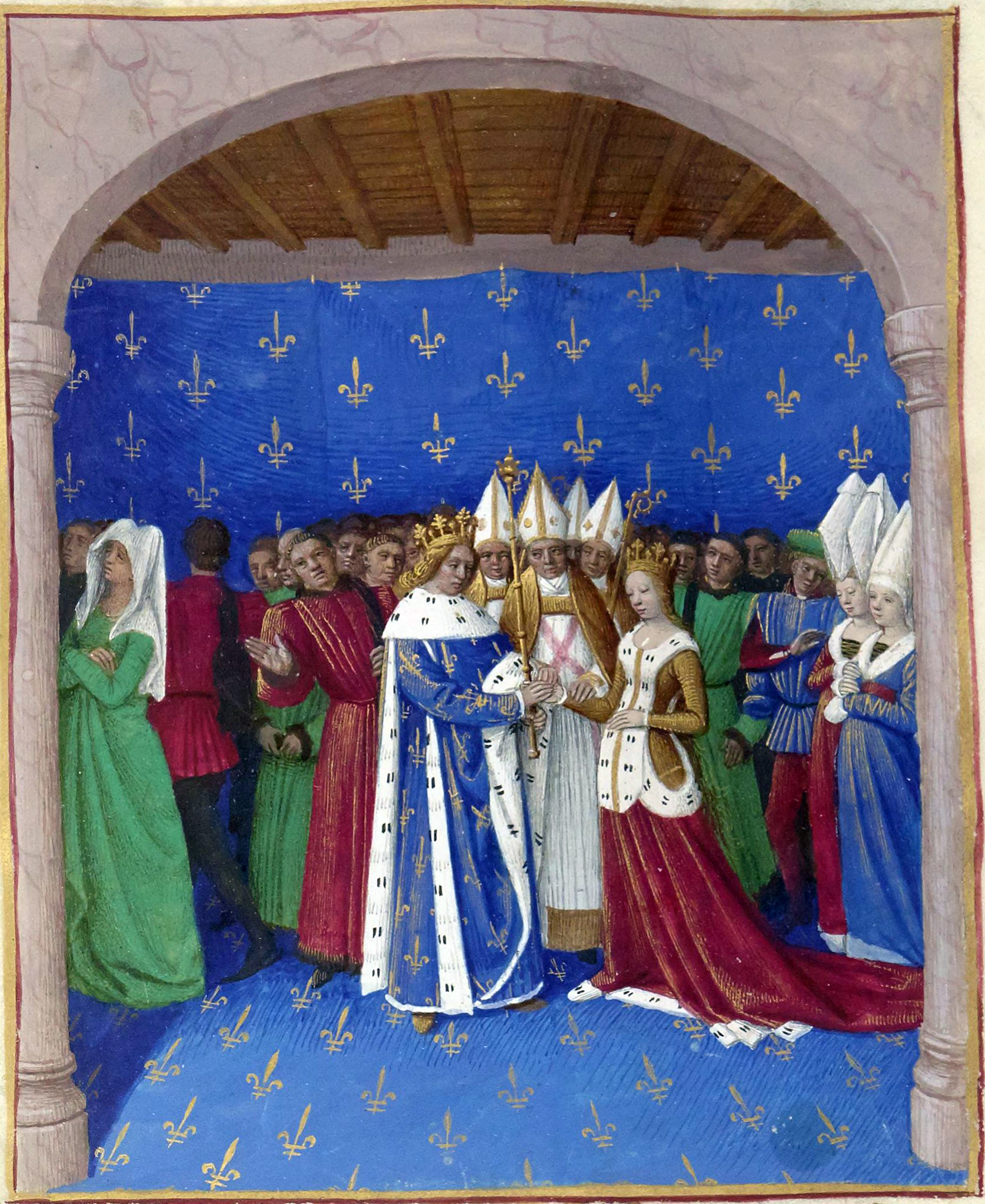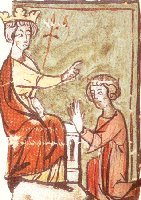|
1328
Year 1328 ( MCCCXXVIII) was a leap year starting on Friday (link will display the full calendar) of the Julian calendar. Events * January 24 – Philippa of Hainault marries King Edward III of England a year after his coronation. The marriage produces ten children, the eldest of whom is Edward the Black Prince. * May 1 – Treaty of Edinburgh–Northampton: England recognises Scotland as an independent nation, after the Wars of Scottish Independence. * May 12 – Antipope Nicholas V is consecrated at St. Peter's Basilica in Rome by the bishop of Venice. * May 26 – William of Ockham secretly leaves Avignon, under threat from Pope John XXII. * May 29 – King Philip VI of France is crowned, founding the House of Valois, after the death of King Charles IV of France, who has no sons to inherit. * August 23 – Battle of Cassel: French troops stop an uprising of Flemish farmers. * Undated – The Augustiner-Bräu is first recorded as the brewery ... [...More Info...] [...Related Items...] OR: [Wikipedia] [Google] [Baidu] |
Battle Of Cassel (1328)
On 23 August 1328, the Battle of Cassel took place near the city of Cassel, 30 km south of Dunkirk in present-day France. Philip VI (King of France from 1328 to 1350) fought Nicolaas Zannekin, a wealthy farmer from Lampernisse. Zannekin was the leader of a band of Flemish rebels. The fighting erupted over taxation and punitive edicts of the French over the Flemish. The battle was won decisively by the French. Zannekin and about 3,200 Flemish rebels were killed in the battle. Beginnings The Count of Flanders, Louis I, was collecting taxes for Charles IV of France. Residents of the bailiwicks of Veurne, St. Winoksbergen, Belle, Kassel, Poperinge and Bourbourg united and refused to pay. The Count threatened reprisals and the people rioted, under the leadership of Nicolaas Zannekin. In 1325, Zannekin captured Nieuwpoort, Veurne and Ypres. He also captured Kortrijk and the Count of Flanders himself. Later attempts to capture Ghent and Oudenaarde failed. In Februar ... [...More Info...] [...Related Items...] OR: [Wikipedia] [Google] [Baidu] |
Philip VI Of France
Philip VI (french: Philippe; 1293 – 22 August 1350), called the Fortunate (french: le Fortuné, link=no) or the Catholic (french: le Catholique, link=no) and of Valois, was the first king of France from the House of Valois The Capetian house of Valois ( , also , ) was a cadet branch of the Capetian dynasty. They succeeded the House of Capet (or "Direct Capetians") to the French throne, and were the royal house of France from 1328 to 1589. Junior members of the ..., reigning from 1328 until his death in 1350. Philip's reign was dominated by the consequences of a succession dispute. When King Charles IV of France died in 1328, the nearest male relative was his nephew Edward III of England, King Edward III of England, but the French nobility preferred Charles's paternal cousin Philip. At first, Edward seemed to accept Philip's succession, but he pressed English claims to the French throne, his claim to the throne of France after a series of disagreements with Philip. T ... [...More Info...] [...Related Items...] OR: [Wikipedia] [Google] [Baidu] |
Charles IV Of France
Charles IV (18/19 June 1294 – 1 February 1328), called the Fair (''le Bel'') in France and the Bald (''el Calvo'') in Navarre, was last king of the direct line of the House of Capet, King of France and King of Navarre (as Charles I) from 1322 to 1328. Charles was the third son of Philip IV; like his father, he was known as "the fair" or "the handsome".Kibler, p.201. Beginning in 1323 Charles was confronted with a peasant revolt in Flanders, and in 1324 he made an unsuccessful bid to be elected Holy Roman Emperor. As Duke of Guyenne, King Edward II of England was a vassal of Charles, but he was reluctant to pay homage to another king. In retaliation, Charles conquered the Duchy of Guyenne in a conflict known as the War of Saint-Sardos (1324). In a peace agreement, Edward II accepted to swear allegiance to Charles and to pay a fine. In exchange, Guyenne was returned to Edward but with a much-reduced territory. When Charles IV died without a male heir, the senior line of t ... [...More Info...] [...Related Items...] OR: [Wikipedia] [Google] [Baidu] |
Treaty Of Edinburgh–Northampton
The Treaty of Edinburgh–Northampton was a peace treaty signed in 1328 between the Kingdoms of England and Scotland. It brought an end to the First War of Scottish Independence, which had begun with the English party of Scotland in 1296. The treaty was signed in Edinburgh by Robert the Bruce, King of Scots, on 17 March 1328, and was ratified by the Parliament of England meeting in Northampton on 1 May. The terms of the treaty stipulated that in exchange for £20,000 sterling, the English Crown would recognise: * The Kingdom of Scotland as fully independent; * Robert the Bruce, and his heirs and successors, as the rightful rulers of Scotland; * The border between Scotland and England as that recognised under the reign of Alexander III (1249–1286). One of two copies of the document, which was written in French, is held by the National Archives of Scotland in Edinburgh. However, the document does not constitute the entire peace treaty, which was contained in a number of in ... [...More Info...] [...Related Items...] OR: [Wikipedia] [Google] [Baidu] |
Wars Of Scottish Independence
The Wars of Scottish Independence were a series of military campaigns fought between the Kingdom of Scotland and the Kingdom of England in the late 13th and early 14th centuries. The First War (1296–1328) began with the English invasion of Scotland in 1296, and ended with the signing of the Treaty of Edinburgh–Northampton in 1328. The Second War (1332–1357) began with the English-supported invasion by Edward Balliol and the 'Disinherited' in 1332, and ended in 1357 with the signing of the Treaty of Berwick. The wars were part of a great crisis for Scotland and the period became one of the most defining times in its history. At the end of both wars, Scotland retained its status as an independent state. The wars were important for other reasons, such as the emergence of the longbow as a key weapon in medieval warfare. The First War of Independence: 1296–1328 Background King Alexander III of Scotland died in 1286, leaving his three-year-old granddaughter Marga ... [...More Info...] [...Related Items...] OR: [Wikipedia] [Google] [Baidu] |
Antipope Nicholas V
Nicholas V, born Pietro Rainalducci (c. 125816 October 1333) was an antipope in Italy from 12 May 1328 to 25 July 1330 during the pontificate of Pope John XXII (1316–1334) at Avignon. He was the last antipope set up by a Holy Roman Emperor. Rainalducci was born at Corvaro, an ancient stronghold near Rieti in Lazio. He joined the Franciscan order after separating from his wife in 1310, and became famous as a preacher. He was elected through the influence of the excommunicated Holy Roman Emperor, Louis the Bavarian, by an assembly of priests and laymen, and consecrated at Old St. Peter's Basilica, Rome, on 12 May 1328 by the bishop of Venice. After spending four months in Rome, he withdrew with Louis IV to Viterbo, but in December 1328 the papal legate Cardinal Orsini began a campaign against Viterbo and Corneto.Salvador Miranda, ''The Cardinals of the Holy Roman Church''ORSINI, Giovanni Gaetano (c. 1285–1335), Retrieved 5 December 2010. Nicholas moved on to Grosseto and ... [...More Info...] [...Related Items...] OR: [Wikipedia] [Google] [Baidu] |
House Of Valois
The Capetian house of Valois ( , also , ) was a cadet branch of the Capetian dynasty. They succeeded the House of Capet (or "Direct Capetians") to the French throne, and were the royal house of France from 1328 to 1589. Junior members of the family founded cadet branches in Orléans, Anjou, Burgundy, and Alençon. The Valois descended from Charles, Count of Valois (1270–1325), the second surviving son of King Philip III of France (reigned 1270–1285). Their title to the throne was based on a precedent in 1316 (later retroactively attributed to the Merovingian Salic law) which excluded females ( Joan II of Navarre), as well as male descendants through the distaff side ( Edward III of England), from the succession to the French throne. After holding the throne for several centuries the Valois male line failed and the House of Bourbon succeeded the Valois to the throne as the senior-surviving branch of the Capetian dynasty. Unexpected inheritance The Capetian dynasty se ... [...More Info...] [...Related Items...] OR: [Wikipedia] [Google] [Baidu] |
Philippa Of Hainault
Philippa of Hainault (sometimes spelled Hainaut; Middle French: ''Philippe de Hainaut''; 24 June 1310 (or 1315) – 15 August 1369) was Queen of England as the wife and political adviser of King Edward III. She acted as regent in 1346,Strickland, Agnes. ''Lives of the Queens of England: From the Norman Conquest'' when her husband was away for the Hundred Years' War. Daughter of Count William of Hainaut and French princess Joan of Valois, Philippa was engaged to Edward, Prince of Wales, in 1326. Their marriage was celebrated in York Minster on 24 January 1328, some months after Edward's accession to the throne of England and Isabella of France's infamous invasion.Un parchemin daté du 15 August 1328 à Northampton, au sceau disparu, énonce qu'Edouard (III), roi d'Angleterre, confirme la fixation du douaire de son épouse Philippa de Hainaut. ''In, G. Wymans, " Inventaire analytique du chartrier de la Trésorerie des comtes de Hainaut ", aux A.E. Mons, n° d'ordre (cote) 596, ... [...More Info...] [...Related Items...] OR: [Wikipedia] [Google] [Baidu] |
Edward III Of England
Edward III (13 November 1312 – 21 June 1377), also known as Edward of Windsor before his accession, was King of England and Lord of Ireland from January 1327 until his death in 1377. He is noted for his military success and for restoring royal authority after the disastrous and unorthodox reign of his father, Edward II. EdwardIII transformed the Kingdom of England into one of the most formidable military powers in Europe. His fifty-year reign was one of the longest in English history, and saw vital developments in legislation and government, in particular the evolution of the English Parliament, as well as the ravages of the Black Death. He outlived his eldest son, Edward the Black Prince, and the throne passed to his grandson, Richard II. Edward was crowned at age fourteen after his father was deposed by his mother, Isabella of France, and her lover Roger Mortimer. At age seventeen he led a successful coup d'état against Mortimer, the ''de facto'' ruler of the ... [...More Info...] [...Related Items...] OR: [Wikipedia] [Google] [Baidu] |
Augustiner-Bräu
Augustiner-Bräu is a brewery in Munich, Germany. Established in 1328, it is Munich's oldest independent brewery. The company is owned by the Edith Haberland Wagner Trust 51% and the Inselkammer-Family 49%. History The Augustiner Brewery was first mentioned by name in 1328, established within an Augustianian Monastery which had been settled just outside the Munich city walls in an area called Haberfeld (or Haferfeld – "oat field") in 1294. The Monastery complex was the largest sacred building in Munich until the completion of the Frauenkirche cathedral in 1494. The Augustinian monks supplied beer to the Bavarian Royal Wittelsbach family until 1589, at which time the Hofbräu brewery was founded. In 1759, the Augustinian Monks of Munich were among the first members of the Bavarian Academy of Sciences and Humanities. Meanwhile, during this era, Augustiner's annual output reached 250,000 liters, three times the amount of an average brewery of the time. In 1803, as part of a ... [...More Info...] [...Related Items...] OR: [Wikipedia] [Google] [Baidu] |
August 23
Events Pre-1600 *30 BC – After the successful invasion of Egypt, Octavian executes Marcus Antonius Antyllus, the eldest son of Mark Antony, and Caesarion, the last king of the Ptolemaic dynasty of Egypt and only child of Julius Caesar and Cleopatra. *20 BC – '' Ludi Volcanalici'' are held within the temple precinct of Vulcan, and used by Augustus to mark the treaty with Parthia and the return of the legionary standards that had been lost at the Battle of Carrhae in 53 BC. * 79 – Mount Vesuvius begins stirring, on the feast day of Vulcan, the Roman god of fire. * 476 – Odoacer, chieftain of the Germanic tribes ( Herulic - Scirian ''foederati''), is proclaimed ''rex Italiae'' (" King of Italy") by his troops. *1244 – Siege of Jerusalem: The city's citadel, the Tower of David, surrenders to the Khwarazmiyya. *1268 – The Battle of Tagliacozzo marks the fall of the Hohenstaufen family from the Imperial and Sicilian thrones, a ... [...More Info...] [...Related Items...] OR: [Wikipedia] [Google] [Baidu] |
Pope John XXII
Pope John XXII ( la, Ioannes PP. XXII; 1244 – 4 December 1334), born Jacques Duèze (or d'Euse), was head of the Catholic Church from 7 August 1316 to his death in December 1334. He was the second and longest-reigning Avignon Pope, elected by the Conclave of Cardinals, which was assembled in Lyon through the work of King Louis X's brother Philip, the Count of Poitiers. Like his predecessor, Clement V, Pope John centralized power and income in the Papacy and lived a princely life in Avignon. John excommunicated the enemies of Edward II of England, while warning Edward of a possible reassessment of the papal grant of Ireland. He opposed the political policies of Louis IV of Bavaria as Holy Roman Emperor, which prompted Louis to invade Italy and set up an antipope, Nicholas V. John opposed the Franciscan understanding of the poverty of Christ and his apostles passing multiple papal bulls to enforce his views. This led William of Ockham to write against unlimited papal powe ... [...More Info...] [...Related Items...] OR: [Wikipedia] [Google] [Baidu] |





